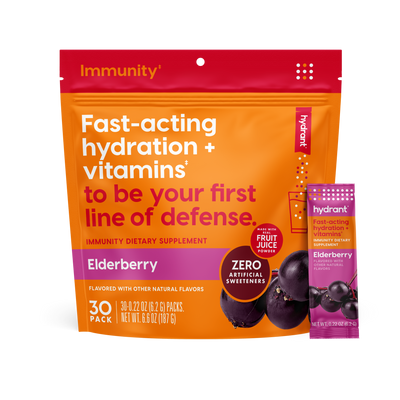As a parent, you want to do everything you can to keep your baby healthy. So, when thinking about their wellness, it’s crucial not to overlook the importance of hydration.
Dehydration can be common among kids of all ages. It’s especially important to be aware of the signs of dehydration in newborns, infants, and toddlers, though, since they can’t express what they’re experiencing.
Here are some tips to help you spot them and keep your little one(s) hydrated and happy!
Dehydration in Babies: What Does It Look Like?

How can you tell if your little one is dehydrated?
Some signs of dehydration are the same across the board. Others look different depending on the age of the child.
Newborns and Infants
Here are some of the most common signs of dehydration to watch for in newborns and infants [1]:
- Concentrated urine that’s dark yellow or orange in color
- Dry lips and/or mouth
- Being more tired than usual
- Increased irritability
- Less than six wet diapers during a 24-hour period
- Less interest in breastfeeding or taking a bottle
- Not producing tears when crying
- Sunken soft spot (fontanelle) on baby's head
Toddlers
Dehydration in toddlers often looks similar to dehydration in newborns and infants, but there are some key differences. The following are the most well-known signs you might notice in toddlers [2]:
- Dark yellow or brownish urine
- Dry or cracked lips
- Not producing urine for 8 hours or longer
- Skin feels cold or dry
- Sunkey eyes
- Low energy levels
- Excessive sleepiness
- Not producing tears when crying
- Being extremely fussy
- Fast breathing
- Fast heart rate
- Acting delirious or confused (in extreme cases)
- Losing consciousness altogether (in extreme cases)
Causes of Dehydration in Babies and Toddlers
Put simply, dehydration happens when a person doesn’t take in enough fluids to replace what they lose throughout the day via sweat, urine, tears, etc.
Babies and toddlers are more vulnerable to dehydration than adults. This is the case because their bodies are about 75 percent (adults’ are about 70 percent) water [3].
The following are some of the most common causes of dehydration that parents ought to be aware of:
Breastfeeding Challenges
Infants and newborns who are struggling with breastfeeding are more prone to dehydration than other babies.

For example, if a baby isn’t latching correctly, they will have trouble getting sufficient milk and fluids. The same is true of babies that don’t breastfeed often enough or long enough, or if the mother is having trouble with her breastmilk supply.
Bottle-Feeding Challenges
Bottle-fed babies can have trouble getting an adequate amount of fluids, too. This can happen if they aren’t fed frequently enough or long enough, just like breastfed babies.
Refusal to Eat Due to Illness
Sometimes, babies and toddlers refuse to eat when they’re not feeling well. This is especially common when they’re dealing with earaches, sore throats, or stuffy noses. All of these issues can interfere with swallowing ability.
Fever
Fevers can cause an increase in fluid loss. Babies and toddlers who have fevers also may not take feedings well or refuse to drink as often as they need to.
Vomiting or Diarrhea
Illnesses that cause vomiting or diarrhea increase a baby or toddler’s risk of becoming dehydrated as well.
Vomiting and diarrhea both lead to excessive fluid and electrolyte (minerals that help with proper hydration) loss. If you don’t replenish these fluids and electrolytes, there’s a good chance dehydration will occur.
Heat Exposure
Exposure to extreme heat or extreme humidity also increases a baby or toddler’s chances of becoming dehydrated. In these conditions, little ones (just like older children and adults) may sweat more than usual. This leads to more fluid and electrolyte loss, and a greater likelihood of developing the symptoms listed above.
What to Do About Dehydration
If your baby or toddler is showing signs of dehydration, act quickly. Here are some steps you can take to get them rehydrated as quickly as possible:
- Offer bottles or breastfeed more frequently (especially if your child isn’t drinking much during each feeding)
- Monitor feedings and wet diapers to track hydration levels
- Control temperature by adjusting the air, using a fan, or removing extra clothing or blankets
You can also talk to your doctor about giving your child an electrolyte drink to help them rehydrate. This can especially be beneficial if your child’s dehydration is linked to an illness that causes vomiting or diarrhea.
If your child’s symptoms of dehydration seem mild and improve by taking basic steps, you might not need to reach out to the doctor. Though, we always err on the side of caution, and recommend you consult with your primary care provider if unsure.
Hydrating Infants, Newborns, and Toddlers
Knowing how to spot and manage dehydration is an essential skill for parents to learn. You can also help your child keep up their hydration levels throughout the day. Here are some tips to help them get enough fluids (some of these you already may be doing!):
Schedule Regular Feedings
Newborns and infants need regular feedings to stay hydrated.
Every baby will have slightly different needs when it comes to the frequency of their feedings. In general, newborns need to be fed every 2-4 hours (8-12 times in a 24-hour period) [5].
Infants can go a little longer in between feedings, especially when they start eating solid foods. Still try to aim for a feeding 3-4 hours, though (6-8 times in a 24-hour period) [6].
Offer Water Regularly
Be sure to offer your toddler water regularly, too. Give them a drink every few hours to help them stay hydrated.
Even if your toddler is still breastfeeding, they need additional water beyond what they get from breastmilk. Since they’re more active, their hydration needs will increase.
Keep Cool
When possible, stay away from extreme heat. During the summer, don’t take your child outside during the hottest parts of the day, or at least stay in the shade to minimize their exposure to direct sunlight.

Bring plenty of water with you when you go outside, too. Offer it to your toddler at regular intervals, especially if they’re running around and sweating a lot.
Be Proactive with Fluids When Sick
If your child does get sick (no matter how careful you are, it still happens from time to time), be proactive when it comes to giving them fluids. Don’t wait until they’re already starting to show signs of dehydration.
Consider increasing the frequency of their breastfeeding or bottle-feeding, especially if you notice that they’re drinking less. Give your toddler a little more water than usual, too, to help minimize their chances of becoming dehydrated.
Learn to Spot Dehydration Symptoms in Babies
Catching babies’ and toddlers’ dehydration symptoms isn’t always easy, and proper hydration is important for your child’s well-being (and your own!). Keep an eye out for the signs of dehydration outlined above and take proactive steps to keep your child happy and hydrated. If unsure about any of the above, feel free to contact your primary care provider.















